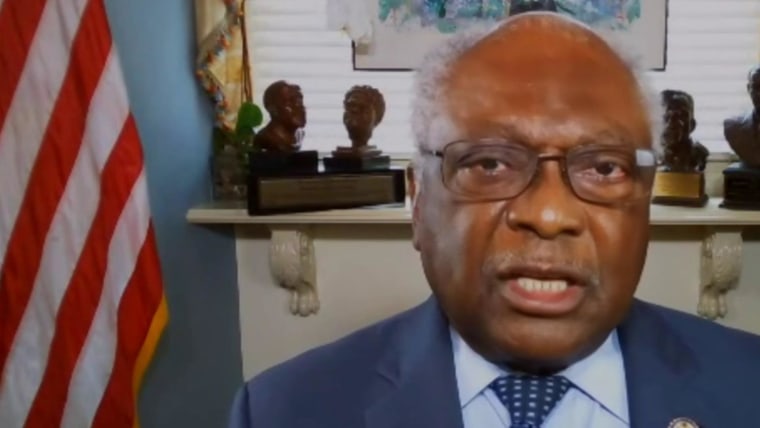WASHINGTON — Joe Biden doesn't need to balance his ticket. He needs to reinforce his message.
When Biden announces a vice presidential pick later this month, he will be telling voters who he thinks has the traits — competence, character and compassion — that he believes are absent in President Donald Trump and necessary to bring America out of the health and economic crises of the pandemic and restore security relationships around the world.
"The first consideration is the most important consideration, obviously: Can this person do the job?" said Patti Solis Doyle, who served as chief of staff for Biden when he was running for vice president in 2008. "Then you’ve got your bucket of political considerations and you’ve got your bucket of personal considerations."
But, as Trump has been slow to discover during the pandemic and conflict over protests for racial justice, basic competence is politics right now. So are character and compassion. If Biden makes a choice that is perceived to be pandering to a particular constituency over the person most capable of reinforcing his approach to the presidency, he risks undermining his own message.
That is, he will have to be able to promote whichever woman he chooses as competent, of strong character and compassionate. In different measures, those traits exist in all of the women Biden is considering, and part of the difficulty for him is in sussing out not only how they are balanced within those potential running mates, but how they will translate to voters.
Of course, no one associated with his campaign will talk about his choice in raw political terms.
"What he wants more than anything is a trusted governing partner, with whom he can have real debates about key issues and who's qualified to serve as president, as was the case with him and President Obama," said one Bidenworld source.
He and his ticket-mate won't be running in a vacuum. Trump, the Republican National Committee and allied Super PACs will work their hardest to persuade voters that neither Biden nor his No. 2 are competent, understand the character of the country or are truly compassionate.
That's one reason that reinforcing his message is important for Biden. But there are others that are more specific to this campaign.
To the extent that vice-presidential candidates have ever helped win particular states — and there's scant evidence to suggest that they are a significant factor — instant communication, the hyper-nationalization of politics and a pandemic that has prevented traditional barnstorming promise to blunt the effects of home-state or regional favorites. A progressive who is liked by liberals in Cleveland is liked by liberals in Phoenix, and a moderate who is liked by centrists in Orlando is liked by centrists in Milwaukee.
Beyond that, voters have reason to wonder whether Biden's pick could become president. He will be 78 on Jan. 20, 2021, the date of the next swearing-in ceremony, which would make him the nation's oldest president.
Biden understands the paradigmatic difference between balance and reinforcement on a ticket: He campaigned in the primaries as the heir to the "Obama-Biden" legacy and often suggested he was selected for the VP job because he and Obama were so like-minded, while the truth is that he was picked to provide experienced, centrist ballast for a newcomer to the political scene who was perceived as progressive.
In recent days, the jockeying for position has intensified, and supporters of various candidates have become more vocal — if not more willing to identify themselves publicly — in pointing out the strengths and flaws of the contenders.
One group of Black women that includes campaign veterans Donna Brazile, Minyon Moore and Karen Finney has pushed Biden to pick from a set of Black candidates that includes Sen. Kamala Harris, D-Calif., former National Security Adviser Susan Rice, and Reps. Karen Bass, D-Calif., and Val Demings, D-Fla. They have noted that Biden's primary victory was propelled in particular by Black women voters, whose enthusiasm will be important in the general election.
Others hope Biden will give strong consideration to Sen. Elizabeth Warren, D-Mass., as a way of raising more money from grassroots donors and energizing white progressives, and still others prefer Michigan Gov. Gretchen Whitmer, whose leadership of a swing state Trump won in 2016 is seen as a potential strength in the Upper Midwest.
But it's hard to project how, if at all, his ultimate pick would significantly expand Biden's coalition. What may be more calculable is the degree to which she can be presented in alignment with Biden's core message for the next 90-plus days — and then have more of a balancing effect. That's what Biden did himself.
"He was willing to follow the strategy in the campaign," Solis Doyle said. "But when it came to governing, he wanted a real partnership and a seat at the table, and that's what I'm sure he is looking for."
"What" - Google News
August 02, 2020 at 05:00PM
https://ift.tt/2Dtz74O
What will guide Joe Biden's vice presidential decision - NBC News
"What" - Google News
https://ift.tt/3aVokM1
https://ift.tt/2Wij67R
Bagikan Berita Ini

















0 Response to "What will guide Joe Biden's vice presidential decision - NBC News"
Post a Comment